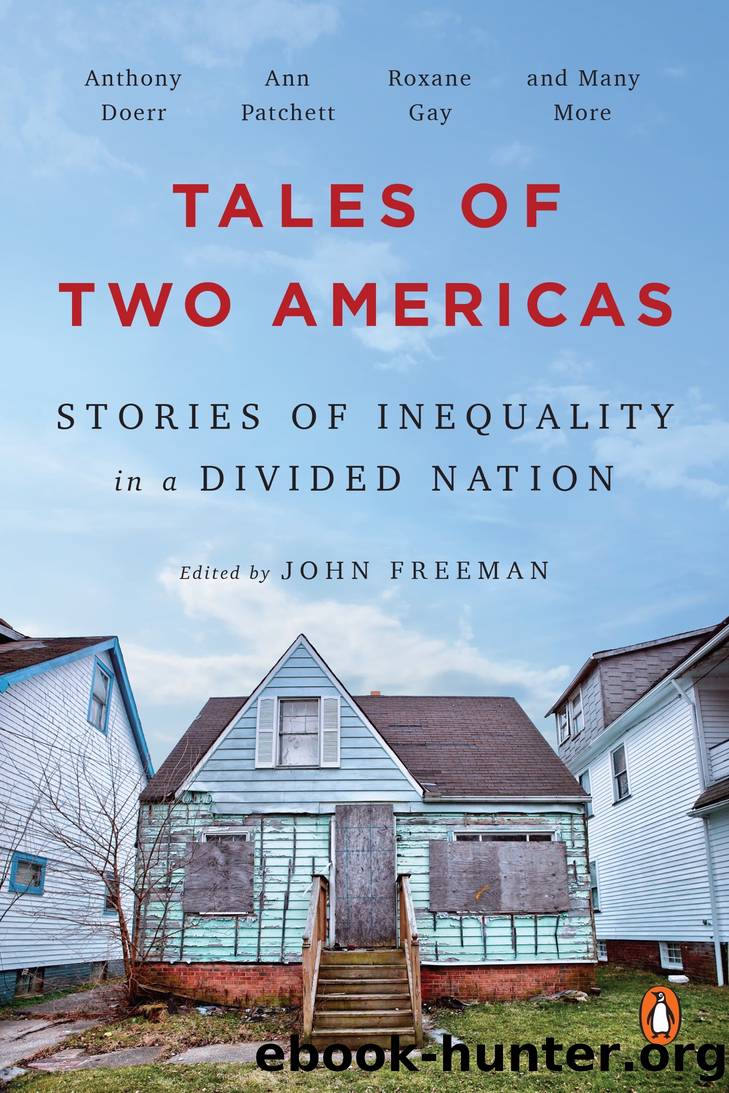Tales of Two Americas by Unknown

Author:Unknown
Language: eng
Format: epub
Publisher: Penguin Publishing Group
Published: 2017-09-05T00:00:00+00:00
HILLSIDES AND FLATLANDS
Héctor Tobar
MY SON WAS STILL sleeping in a crib. We set him down each night, my wife and I, in his cushioned cocoon, lined with bumpers festooned with dinosaurs in primary colors. When he woke up in the middle of the night, Iâd pick him up and feed him, sway and coo, and sing him back to sleep, with âHush little baby donât say a word . . .â followed by a series of improvised verses, âAnd if that wine donât make you dance, Papaâs going to buy you a pair of pants . . .â Then Iâd watch him sleep, brown skin and full lips, puffing infant breaths on a cottony rectangle, protected, my son.
I was a father for the first time. Iâd given up on my dreams to be a novelist, and taken a job at a newspaper for the health insurance, because thatâs what fathers do. My home was filled with the baked-bread smell of regurgitated motherâs milk, and Iâd learned how to change diapers. In the mornings, Iâd give my baby boy a kiss good-bye and leave for the newsroom, where my editors scanned their green-glowing computer screens for dispatches of overnight violence. They would then send me into the big, asphalted, graffitied, subdivided coastal plain of working Los Angeles, where the palm trees were as old as great-grandfathers. I believed it was my calling to bear witness, to speak for the voiceless, but an entry-level job those days required months and maybe years on the cop beat. So I traveled into the harried and sooty grid inhabited by people of African and Latin American descent. These were the early days of the Automatic Weapons Era, and there were bodies to be counted, witnesses and survivors and families to interview after the firefights of the night and the weekend before.
I was born and raised in a Los Angeles that did, and did not, resemble these battlefields. My Guatemalan parents and I were not well off, in our East Hollywood neighborhood; but the phrase âdrive-by shootingâ was unknown to me. Our neighborhood was gang-free and racially integrated. At least one murderer lived nearby, in an apartment that was less than a block from my familyâsâJames Earl Ray, who went on to kill Martin Luther King Jr. But I remember no gunplay growing up. We lived on a humble grid of side streets squeezed between Sunset and Hollywood Boulevards, among assorted working people, artists, immigrants, and drifters. In our corner of East Hollywood, Jews and Armenians and white Southerners lived alongside Mexicans and Eastern European exiles. My best friends were from Arkansas, Lebanon, the Philippines, and Czechoslovakia. We played baseball on the tarry blacktop of our elementary school for hours on end, and walked home along streets lined with brick apartments built in the 1930s, and wide Craftsman homes, and birds of paradise and jade plants covered with dust.
My long Angeleno coming-of-age coincided with the cityâs long, steady postindustrial decline. Oil embargoes and plant closings, and
Download
This site does not store any files on its server. We only index and link to content provided by other sites. Please contact the content providers to delete copyright contents if any and email us, we'll remove relevant links or contents immediately.
| Africa | Americas |
| Arctic & Antarctica | Asia |
| Australia & Oceania | Europe |
| Middle East | Russia |
| United States | World |
| Ancient Civilizations | Military |
| Historical Study & Educational Resources |
The Dawn of Everything by David Graeber & David Wengrow(1707)
The Bomber Mafia by Malcolm Gladwell(1625)
Facing the Mountain by Daniel James Brown(1553)
Submerged Prehistory by Benjamin Jonathan; & Clive Bonsall & Catriona Pickard & Anders Fischer(1456)
Wandering in Strange Lands by Morgan Jerkins(1430)
Tip Top by Bill James(1416)
Driving While Brown: Sheriff Joe Arpaio Versus the Latino Resistance by Terry Greene Sterling & Jude Joffe-Block(1376)
Red Roulette : An Insider's Story of Wealth, Power, Corruption, and Vengeance in Today's China (9781982156176) by Shum Desmond(1359)
Evil Geniuses: The Unmaking of America: A Recent History by Kurt Andersen(1354)
The Way of Fire and Ice: The Living Tradition of Norse Paganism by Ryan Smith(1336)
American Kompromat by Craig Unger(1315)
F*cking History by The Captain(1304)
It Was All a Lie by Stuart Stevens;(1300)
American Dreams by Unknown(1286)
Treasure Islands: Tax Havens and the Men who Stole the World by Nicholas Shaxson(1274)
Evil Geniuses by Kurt Andersen(1257)
White House Inc. by Dan Alexander(1212)
The First Conspiracy by Brad Meltzer & Josh Mensch(1174)
The Fifteen Biggest Lies about the Economy: And Everything Else the Right Doesn't Want You to Know about Taxes, Jobs, and Corporate America by Joshua Holland(1126)
